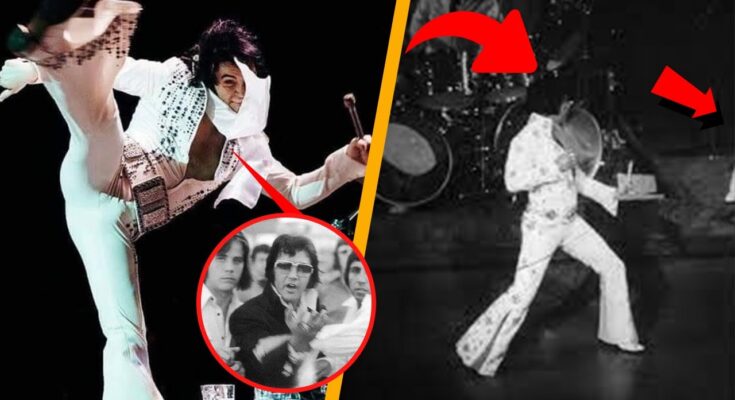
In February 1973, Elvis Presley, the King of Rock ‘n’ Roll, took the stage in Las Vegas, ready to deliver yet another iconic performance. What began as an exciting evening quickly turned into chaos when four men and a woman disrupted the show with an unexpected display of aggression. This shocking incident not only tested Elvis’s nerves but also highlighted his legendary resilience and charisma in the face of danger.
The energy in the Las Vegas venue was electric as fans eagerly anticipated Elvis’s return, especially after the success of his “Aloha from Hawaii” special. Behind the scenes, however, Elvis was grappling with personal struggles, including serious throat issues and the emotional fallout from his recent divorce from Priscilla Presley. Despite these challenges, he remained determined to give his audience the electrifying performances they had come to expect.
As the show kicked off, Elvis captivated the crowd with his powerful voice and dynamic stage presence. But soon, the attention of the audience shifted to a group near the stage, whose disruptive behavior included rolling beer bottles across the floor. The tension escalated when a woman from the group approached Elvis, taking a scarf from around his neck and returning to her table without a word, signaling that something was amiss.
The situation reached a breaking point during the performance of “Suspicious Minds.” As Elvis incorporated karate moves into his routine, two men from the disruptive group made their way toward the stage. Elvis, aware of their approach, swiftly executed a karate strike, sending one of the attackers flying off the stage. The audience erupted in a mixture of shock and admiration, as Elvis demonstrated not only his musical talent but also his ability to defend himself.
Elvis’s loyal bodyguards quickly intervened, tackling the remaining attackers and restoring order. The crowd, initially stunned by the unfolding drama, soon erupted in applause for the King, who had just proved his mettle in an extraordinary way. As the chaos subsided, Elvis returned to the microphone, addressing his fans with a blend of anger and determination. He expressed regret for not responding more severely to the attackers, vowing never to tolerate such disrespect at his shows again. The audience roared in approval, their cheers echoing throughout the venue as they rallied behind their hero.
Backstage, the atmosphere was tense as Elvis processed the shocking events. His initial anger transformed into paranoia, as he wondered if the attack had been orchestrated by someone close to him, especially Mike Stone, Priscilla’s new partner. However, investigations revealed that the attackers were likely just overly enthusiastic fans who had lost control, rather than hired goons with a vendetta. Gradually, Elvis’s anger subsided, and with reassurances from his trusted friends, he found some peace.
Despite the earlier chaos, the TCB band maintained their professionalism, playing on without missing a beat. Their unwavering dedication underscored the resilience and determination that defined Elvis’s career. This incident served as a reminder of the complexities and dangers that came with fame, as Elvis navigated not only the music industry but also the threats that frequently accompanied his status.
Reflecting on that extraordinary night, it’s clear that the events of February 1973 were more than just a moment of chaos. They showcased Elvis’s strength, both as a performer and a person. His quick and courageous reaction not only demonstrated his physical prowess but also reinforced his legendary status as a figure of immense personal strength. This shocking episode became another chapter in the rich tapestry of Elvis’s storied career, further cementing the myth of the King, who could face any challenge that came his way.



